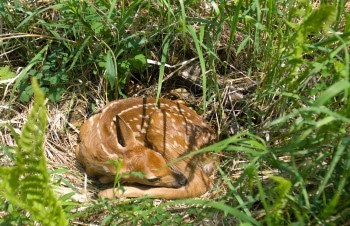
|
As the weather continues to warm, baby wildlife will venture out of their nests or dens. If you have a chance to see this new generation of wildlife, remember to enjoy it from a distance and leave these babies alone.
"Fawns are a common sight this time of year, and it is not unusual to find them by themselves in backyards or neighborhoods," said Hannah Schauer, a DNR wildlife communications coordinator. "The mother deer will come back to nurse and care for her baby when she feels it is safe to do so."
A baby animal on its own rarely is abandoned; its best chance for survival is in the wild, so never remove a wild animal from its natural setting.
"By hiding her babies and going elsewhere, the mother is helping them stay safe from predators by not drawing attention to where her babies are," said Schauer. "In addition, youngsters like fawns have excellent camouflage to make them harder for predators to find."
Eventually, the young animals will be strong and fast enough to be on their own or accompany their mother while she looks for food.
Fledgling birds hopping around on the ground also are a normal sight this time of year. These young birds are getting old enough to start trying to fly and need more space than their nests provide. Even when the chicks are starting to fledge and leave the nest, the parents will continue to feed and care for them.
Only licensed wildlife rehabilitators may possess abandoned or injured wildlife. Unless a person is licensed, it is illegal to possess a live wild animal in Michigan.
Learn more about what to do if you find a baby animal in the wild and see a list of licensed wildlife rehabilitators at Michigan.gov/Wildlife or contact DNR Wildlife Division at 517-284-9453.